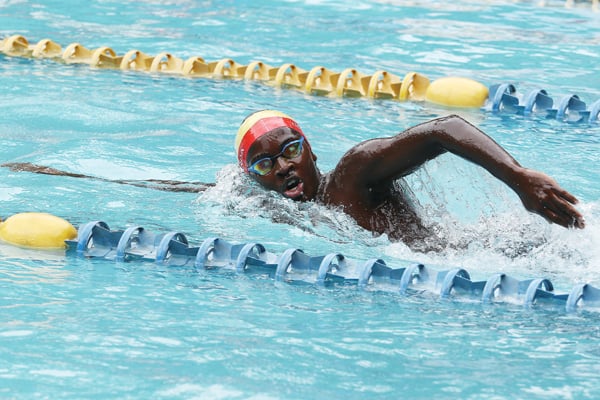Uganda’s swimming progress measured through 50m freestyle

Bright future. John Kafumbe in action at the ongoing Cana Zone III Swimming Championships. Kafumbe is one of Uganda’s promising freestylers across all distances. PHOTO / JOHN BATANUDDE
What you need to know:
- Adnan Kabuye was one of those being pushed to get as close as possible to Tendo Mukalazi’s 23.10 seconds national short course (25m pool) record set in the 50m freestyle during last month’s Fina World Cup in Kazan.
Midway through the November 26-28 National Championships at Greenhill Academy in Kibuli, it looked so clear that Dolphins Swim Club would defend their 2019 title.
But coaches Tonnie Kasujja and Muzafaru Muwanguzi were still laying performance strategies for their athletes.
“We compare our results to those abroad (Dolphins-attached swimmers on scholarships) so we don’t just want to win here but to get good times,” muwanguzi said.
Adnan Kabuye was one of those being pushed to get as close as possible to Tendo Mukalazi’s 23.10 seconds national short course (25m pool) record set in the 50m freestyle during last month’s Fina World Cup in Kazan.
Kabuye returned 24.94 but as national coach Muwanguzi prepares Uganda for the 50m and 100m free events in the Cana Zone III Swimming Championships today, he will ask for more from everyone.
When he was still president of Uganda Swimming Federation (USF), Donald Rukare would measure progress through the improvement of times at the world stage.
In the lead up to the 2016 Olympics, Rukare would often add that if Uganda got swimmers recording 25 seconds in 50m free, it would be huge progress.
It looked a significant task then because the women’s qualification time for the London 2012 and Rio 2016 Olympics was 25.27 and 25.28, respectively. The men’s was 22.88 and 23.05, but the women’s cut-off was a yardstick good enough for all.
Uganda has never qualified a swimmer directly for any international engagement but Fina has always offered universality slots for its developing nations.
The 50m free, one of the few events Fina offers on wild card, has thus become a popular among Ugandan swimmers since 2001. About 42 have been to Fina events since 1984, 26 (16 men and 10 women) of those who attempted the 50m free.
How they have come through
The earliest available record of Uganda’s swimming in Fina events show that Daniel Mulumba did 100m free at the 1984 Los Angeles Olympics, clocking 1:07.86 minutes.
Fourteen years later, Mohammed Ssebulime (1:03.57) attempted it at the World Championships in Perth, then women’s representative Supra Singhal (1:08.15) at the Sidney 2000 Olympics.
However, when Joel Atuhaire travelled to Fukuoka 2001, he attempted the 50m free (27.81 seconds) and Uganda has never looked back.
Since then, Uganda has featured 50m freestyler at every Olympics; Edgar Luberenga (2004), Gilbert Kaburu and Aya Nakitanda (2008), Ganzi Mugula and Jamila Lunkuse (2012), Joshua Ekirikubinza (2016) and Kirabo Namutebi (2021) – without any hitting Rukare’s pass mark.
Ugandans, including Muwanguzi (Melbourne 2007 – 28.30), have also attempted it at every Worlds (long course) since.
For long course, the first time a Ugandan went under 25 at a major gala was during the 2019 Worlds in Gwangju when Atuhaire Ambala, then on Fina scholarship in Thailand, managed 24.69 to break Elisha Ekirikubinza’s 25.54 national record (NR) set in Kazan in 2015.
Under 24, closer to 22
Ambala’s efforts were bettered by Tendo Mukalazi at the 2021 Africa Junior and Senior Championships in October in Ghana as he set a dream 23.87.
A fortnight later, Mukalazi grabbed the aforementioned 23.10 short course record too – 17 years after Gilbert Kaburu and Nana Nakiddu attempted the 50m free at the Worlds in Indianapolis, sparking off short course representation in 50m free since.
Mukalazi’s NR is microseconds off next weekend’s short course Worlds’ entry time (22.50) for men but he was equally thrilled by how closer he is to reaching 22 seconds.
However, the plaudits from Kazan, where he got the record, were mostly for his sister Namutebi’s 25.84 NR, which is microseconds off the 25.46 women’s 50m free qualification time for Abu Dhabi.
This was after she had lowered the 26.63 long course NR achieved at the Olympics to 26.26 and the 100m’s NR to 59.80 in Ghana.
100m not forgotten
The Abu Dhabi-bound siblings are now the standard setters. Mukalazi lowered the long course 100m NR to 53.18 in Ghana then made 50.94 for short course in Kazan.
The 100m have been popular in the long course Worlds with Uganda only missing representation in 2003, 2011 and 2015.
However, at the Olympics, it was shunned from 1984 until Singhal did it in 2000 although it had to wait another 17 years as Ambala (Tokyo 2021) managed 54.23 after beating Covid-19.
In short course, the 100m has been unpopular at the world stage although it attracts numbers across all age groups in local competitions. Aya Nakitanda (1:08.23) was the first at it at the 2008 Worlds.
In 2010 in Dubai, Conrad Gaira (1:04.60) and Ronald Daisuke Ssegwanyi (1:01.72) attempted. However, there was a watershed moment in 2018 in Hangzhou when Fadhil Saleh (54.36) clockedp under a minute.
“It is interesting how far we have come,” Max Kanyerezi, who swum 50m and 100m breaststroke in Shanghai 2006 and 50m breast and butterfly in Dubai, told Score.
“There was a time 27 was okay. Then we started breaking into 25 but we never thought the 23 (men) and 25 (women) would come this soon. Even in the 100m, going under a minute is tremendous but it comes down to empowering our coaches to prepare athletes to maximise such opportunities.
“Tendo has achieved that time away from home in less than six months because his coaches here laid the right foundation,” added the USF general secretary.




